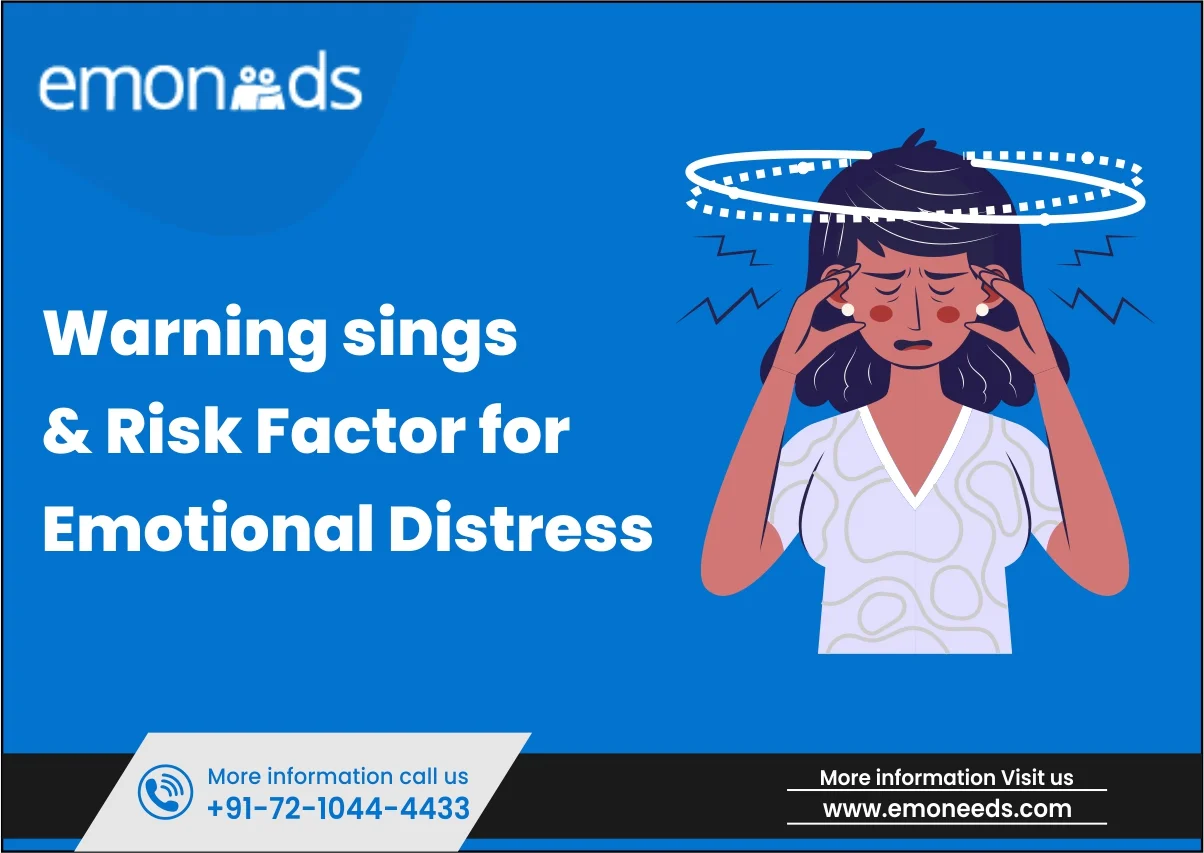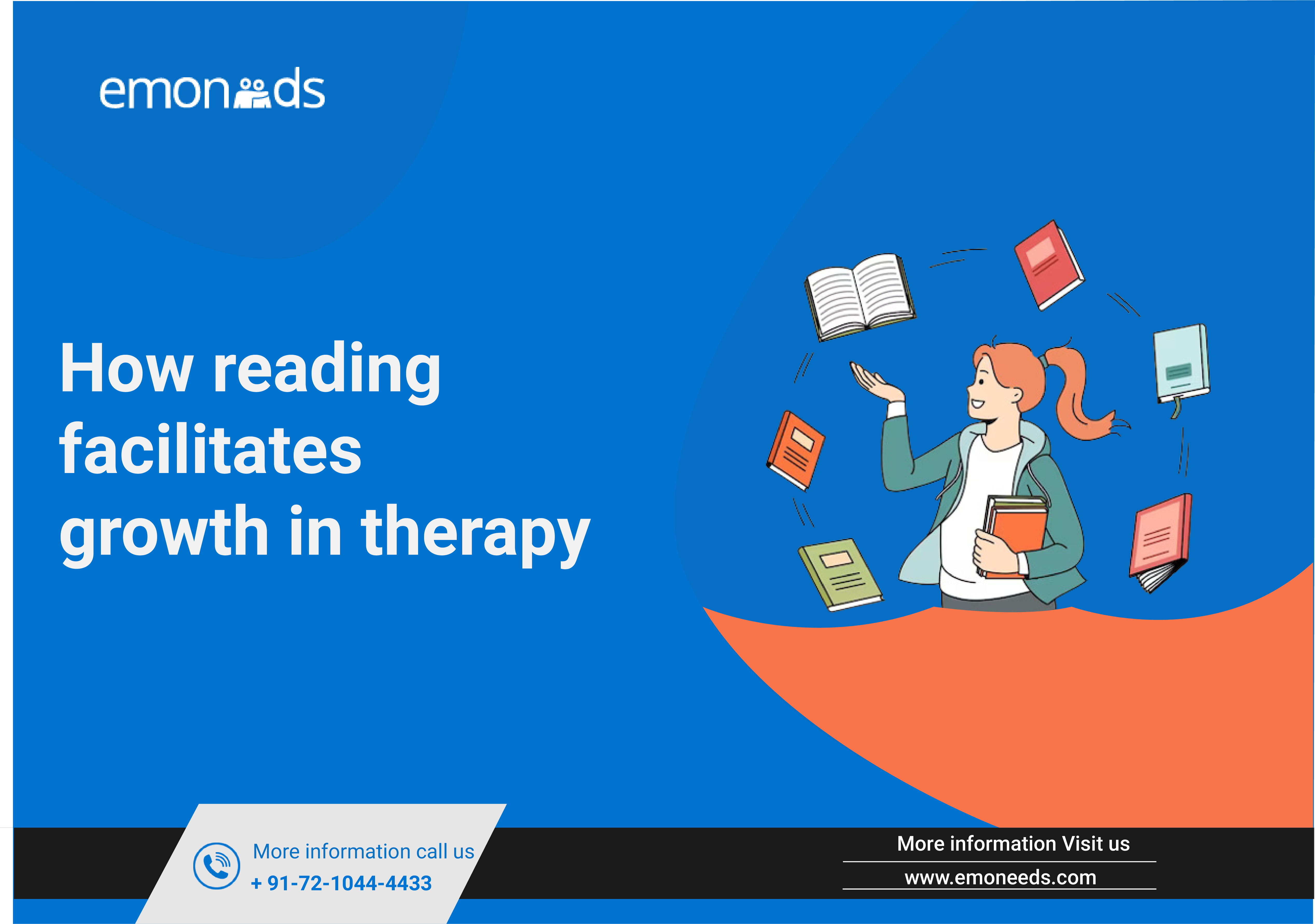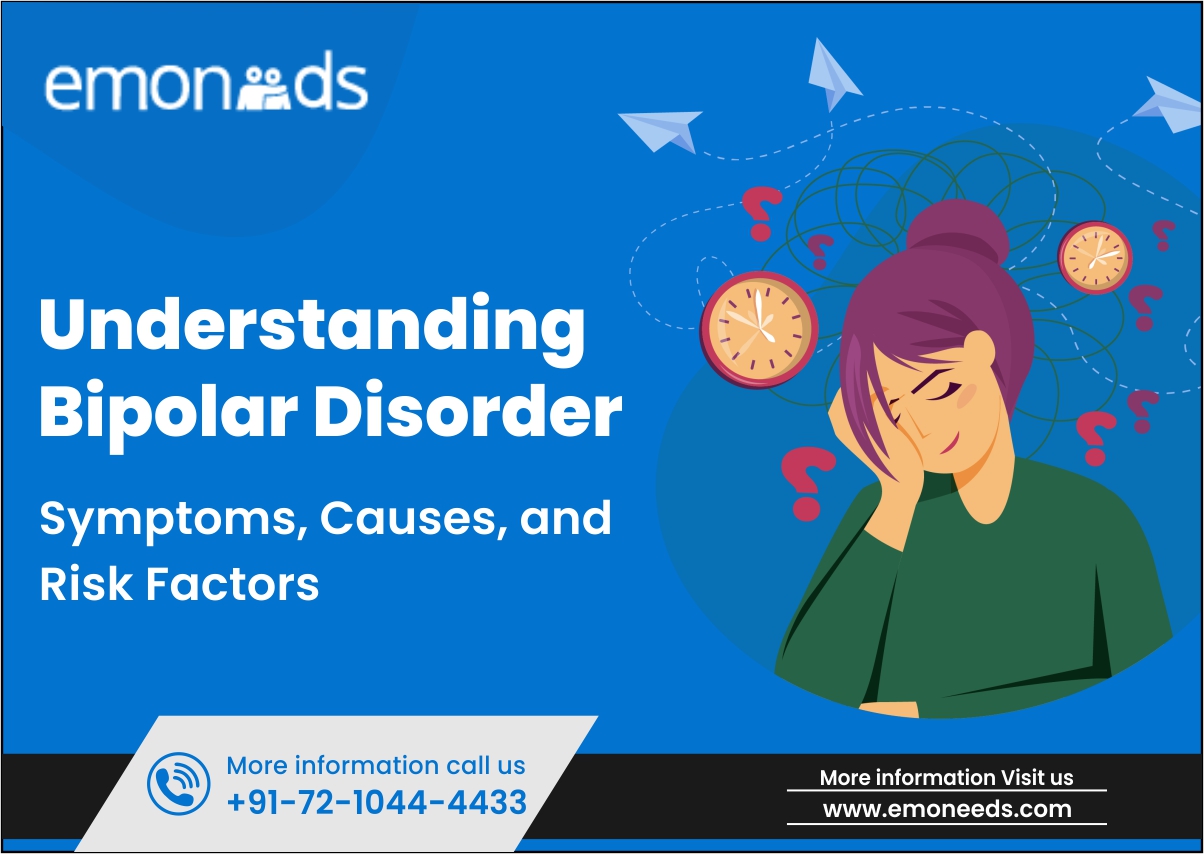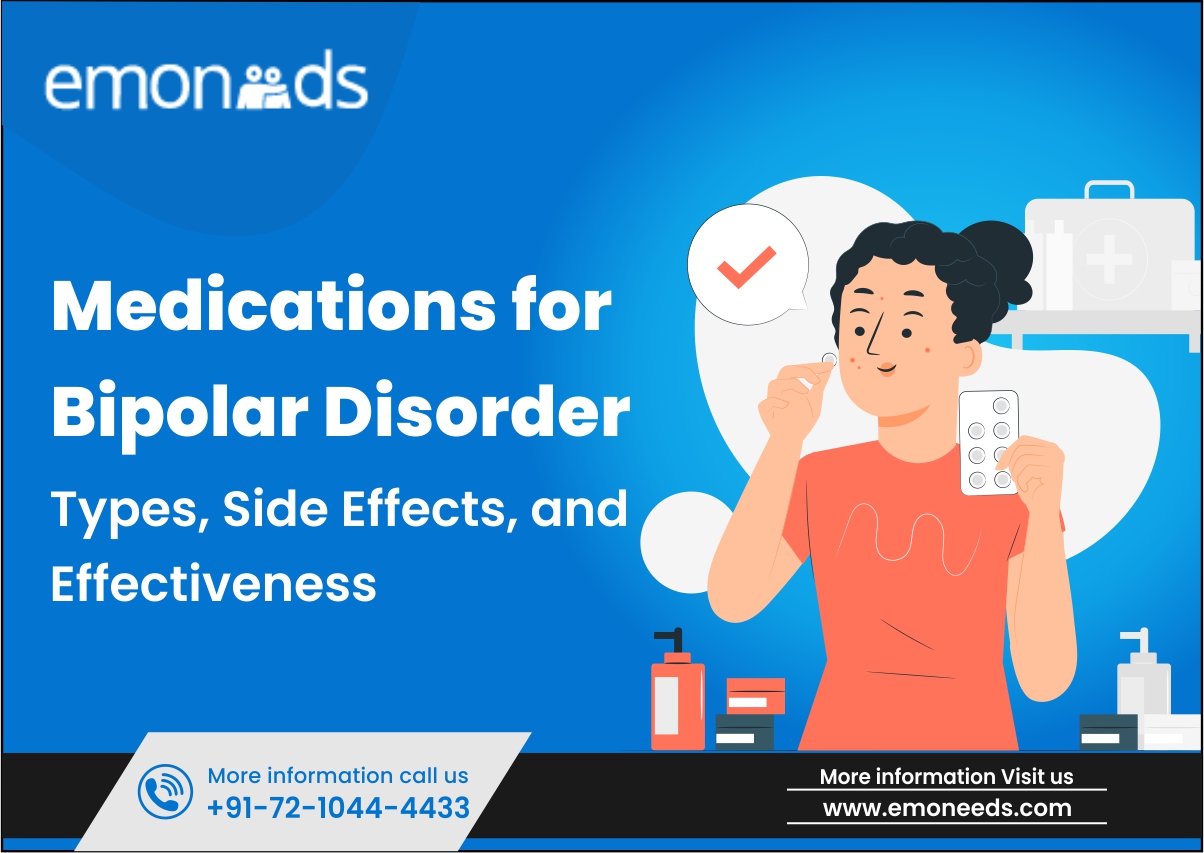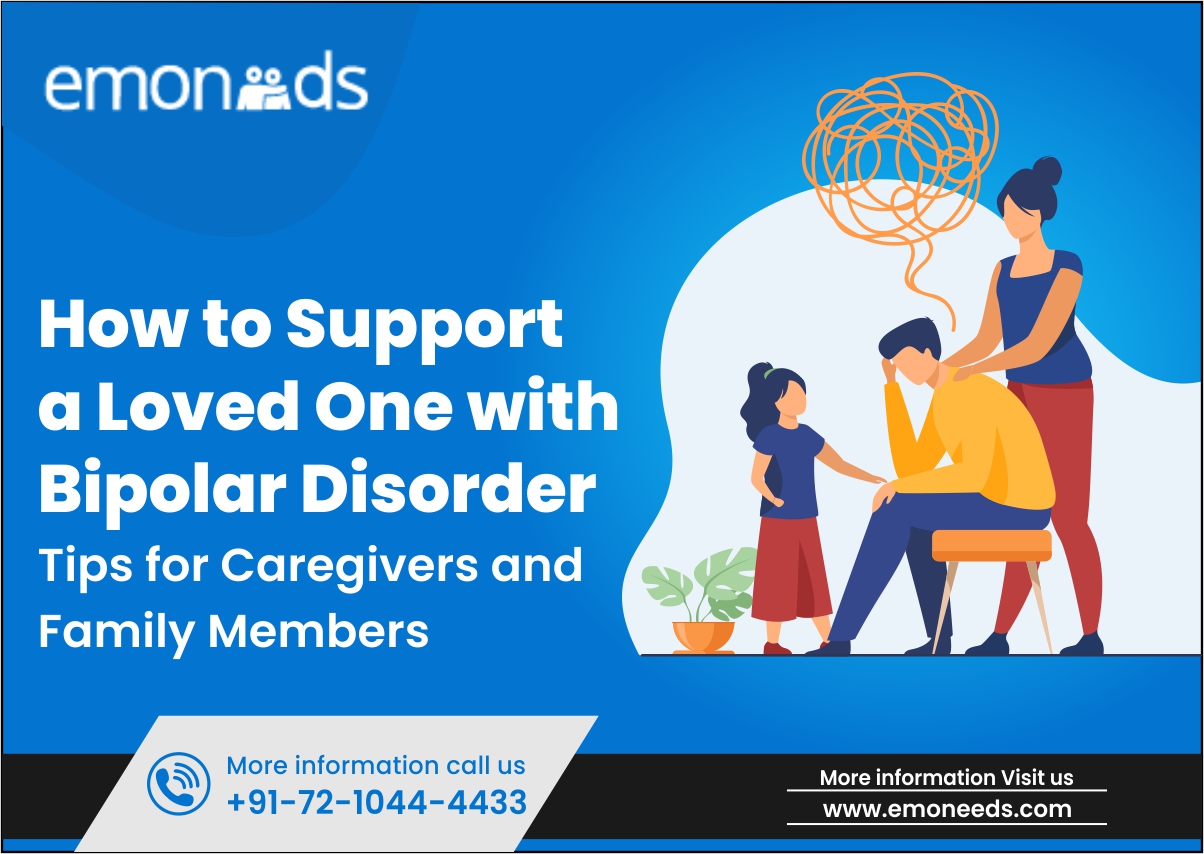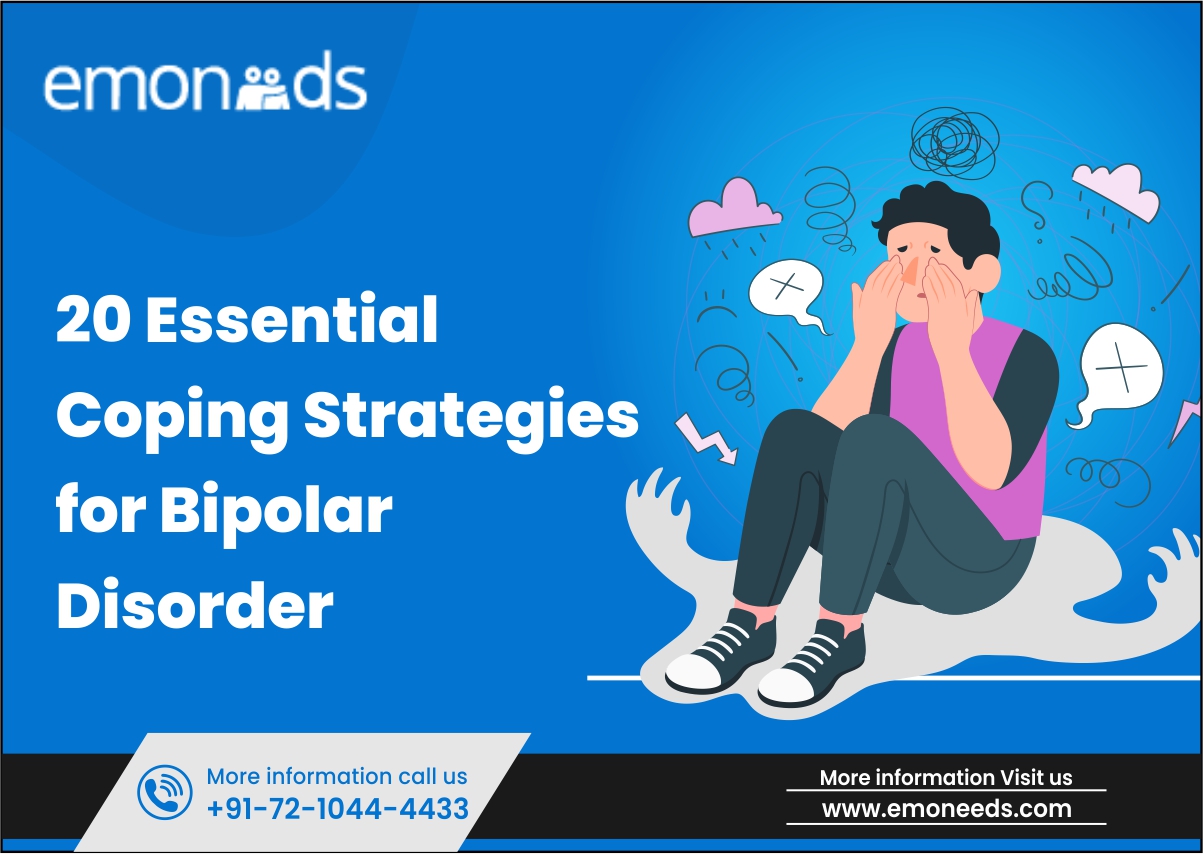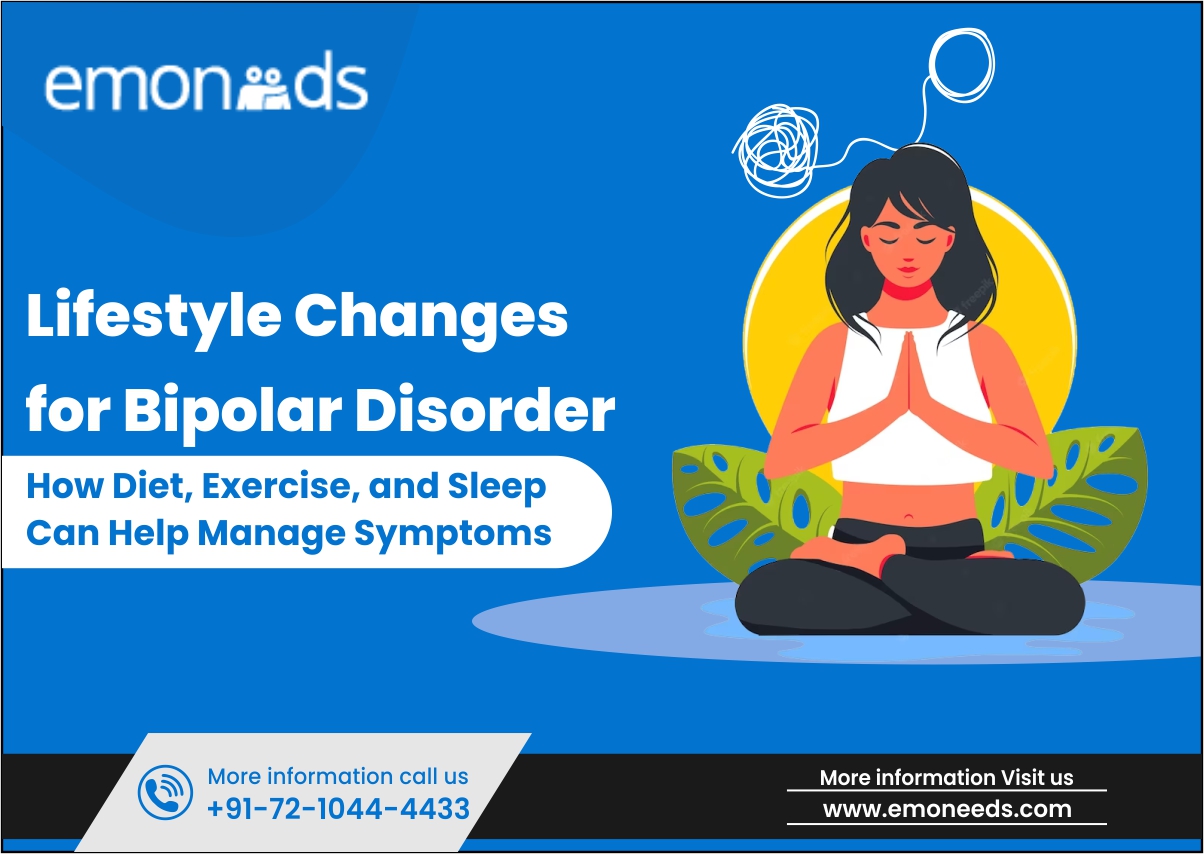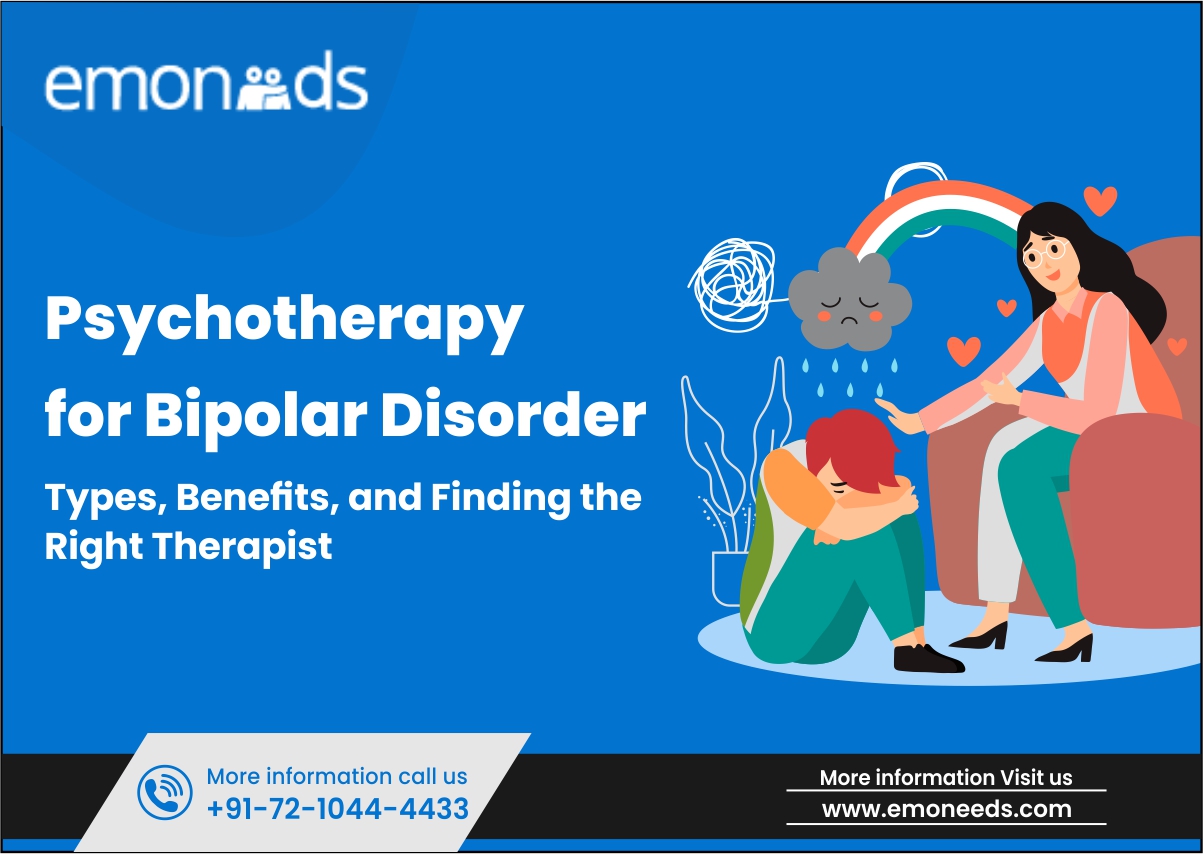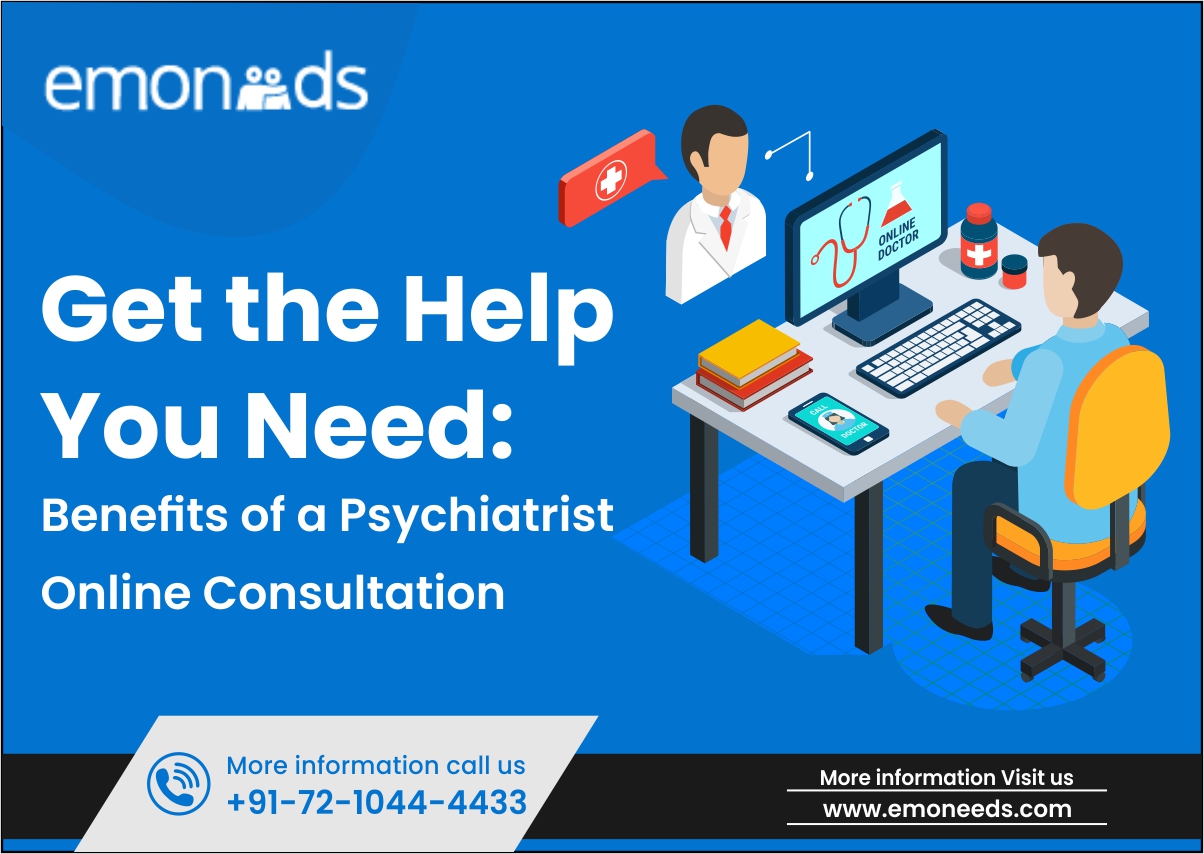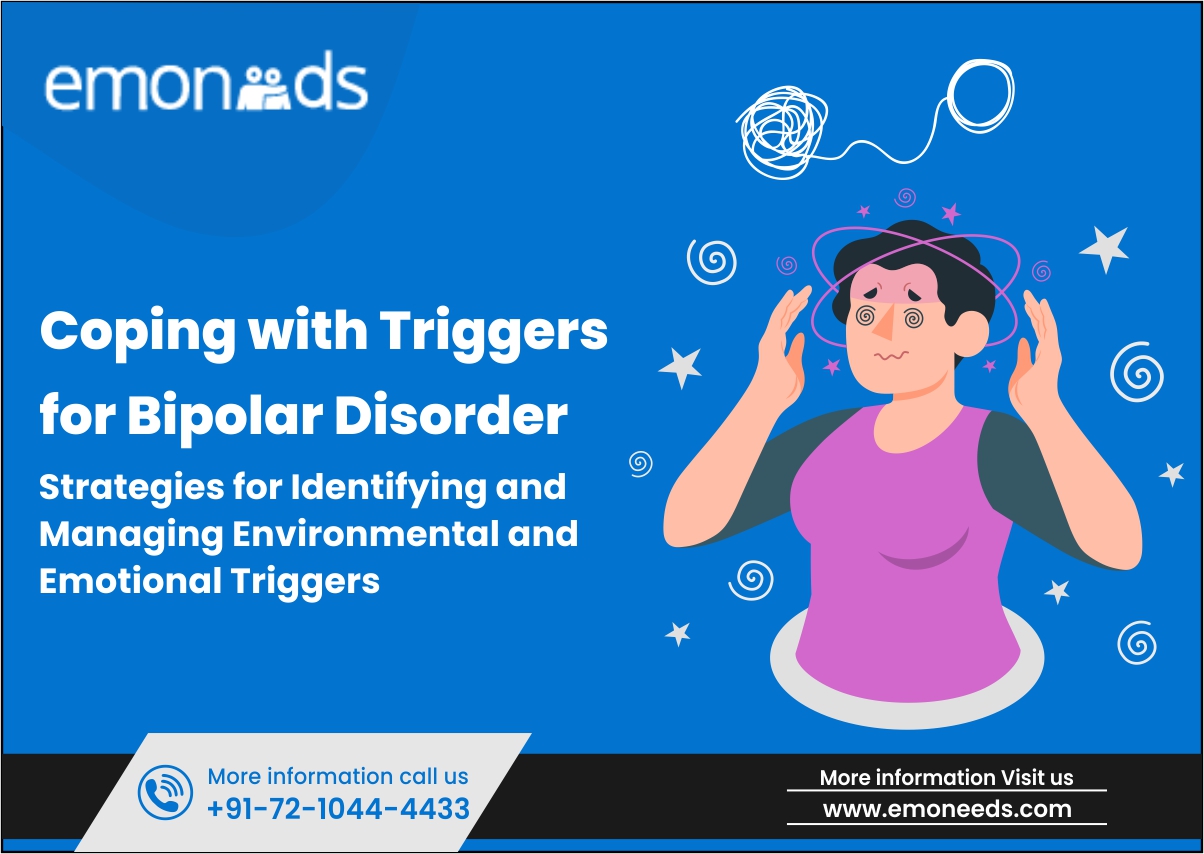
- August 1, 2023
- Saloni Kabra
- 0
Navigating the ups and downs of bipolar disorder can be a challenging journey. The erratic mood swings can disrupt every aspect of life. However, by understanding and managing triggers associated with bipolar disorder, individuals can regain stability and prevent episodes.
In this blog, we will explore effective strategies for identifying and managing environmental and emotional triggers. With the right tools and support, you can navigate the complexities of bipolar disorder and live a more balanced and fulfilling life. Emoneeds is here to provide comprehensive care and personalized support on your journey to well-being.
Table of Contents
ToggleI. Understanding Triggers in Bipolar Disorder:
A. Definition and Types of Triggers:
Triggers, in the context of bipolar disorder, refer to factors that can precipitate or exacerbate mood swings and episodes. Triggers can be broadly categorized into environmental and emotional triggers. Environmental triggers encompass external factors, such as disruptions in sleep patterns, excessive stress levels, or substance abuse. Emotional triggers, on the other hand, involve intense emotional experiences, interpersonal conflicts, or major life changes that can impact mood stability.
B. Environmental Triggers:
Environmental triggers can significantly influence the delicate balance of emotions in individuals with bipolar disorder. It’s important to recognize and address these triggers to maintain stability. Here are some common environmental triggers:
- Disrupted sleep patterns: Irregular sleep schedules or insufficient sleep can disrupt the body’s natural rhythm and trigger mood swings. Establishing a consistent sleep routine and practicing good sleep hygiene, such as creating a calm sleep environment and avoiding stimulants before bed, can help regulate sleep patterns.
- Excessive stress: High levels of stress from work, relationships, or financial pressures can act as triggers for episodes. Developing stress management techniques, such as mindfulness, exercise, and time management, can help mitigate the impact of stress on mood. Engaging in relaxation exercises, seeking support from a therapist, or implementing stress-reducing activities like yoga or meditation can be beneficial.
- Substance abuse: Alcohol or drug consumption can worsen symptoms and contribute to mood instability. Substance abuse can disrupt medication effectiveness and increase the risk of mood swings and episodes. Avoiding substance abuse and seeking appropriate support for substance use disorders is essential for managing triggers effectively. Engaging in substance abuse treatment programs, attending support groups, and developing healthy coping mechanisms can help individuals maintain stability and reduce the impact of substance abuse on their bipolar disorder.
- Disruptive or unstable living environments: Chaotic or unstable living environments can create additional stress and trigger episodes. Unpredictable living situations, frequent changes in residence, or conflicts within the household can contribute to mood instability. Establishing a stable and supportive living environment, seeking assistance from family or friends, or considering supportive housing options can provide a sense of stability and reduce environmental triggers.
C. Emotional Triggers:
Emotional triggers have a profound impact on individuals with bipolar disorder. Identifying and managing these triggers is crucial for maintaining emotional well-being. Here are some examples of emotional triggers:
- Intense emotional experiences: Grief, loss, or traumatic events can destabilize mood and trigger depressive or manic episodes. Engaging in therapy or support groups to process and heal from these experiences can help manage their impact on mood.
- Interpersonal conflicts: Strained relationships, conflicts at work, or difficulties in personal connections can have a significant emotional impact. Effective communication, setting boundaries, and seeking relationship counseling when needed can aid in managing these triggers.
- Major life changes: Significant life changes, such as moving to a new city, starting a new job, or going through a divorce, can induce stress and trigger episodes. Building a strong support system, practicing self-care, and seeking professional guidance during times of change can help navigate these triggers more effectively.
Recognizing these environmental and emotional triggers is the first step toward effectively managing them.
II. Strategies for Identifying Triggers:
A. Self-Reflection and Awareness:
Developing self-reflection and awareness is a powerful tool for recognizing personal triggers. Here are some additional strategies to enhance self-awareness:
- Identify common themes: Look for common themes or situations that consistently precede mood shifts or episodes. Reflect on past experiences and identify specific social settings, work-related stressors, or types of relationships that have triggered changes in your mood. Recognizing these patterns can help you anticipate and prepare for potential triggers in the future.
- Take note of physical cues: Pay attention to any physical cues that may accompany mood changes. Notice changes in your body, such as increased heart rate, muscle tension, changes in appetite, or sleep patterns. These physical cues can provide valuable insights into your emotional state and help you recognize triggers before they escalate.
- Involve loved ones: Trusted friends and family members can offer a fresh perspective and provide valuable insights into your triggers. Engage in open and honest conversations with them, sharing your experiences and asking for their observations. Sometimes, others may notice patterns or triggers that you might have missed, offering a different viewpoint that can contribute to your self-awareness.
B. Seeking Professional Guidance:
Consulting mental health professionals, such as therapists and psychiatrists, can provide invaluable support in identifying triggers. Here are some additional benefits of seeking professional guidance:
- Objective perspective: Mental health professionals can offer an objective perspective on your experiences, helping you gain insight into potential triggers and patterns.
- Expert knowledge: Professionals have in-depth knowledge and expertise in identifying triggers specific to bipolar disorder. They can guide you through the process of recognizing and managing triggers effectively.
- Personalized strategies: Working with a professional allows for tailored strategies and coping techniques that are specific to your unique triggers and circumstances.
Remember, identifying triggers is a personal and ongoing process. It requires self-reflection, awareness, and often the support of mental health professionals.
III. Managing Triggers and Preventing Bipolar Episodes:
A. Lifestyle Modifications:
Making lifestyle modifications is essential for managing triggers and maintaining stability. Here are some strategies to consider:
- Establish a balanced routine: Create a daily schedule that includes regular sleep patterns, exercise, and nutritious meals. Consistency in these areas can positively impact mood regulation.
B. Stress Management Techniques:
Effective stress management is crucial for managing triggers. Consider these techniques:
- Mindfulness and relaxation practices: Engage in mindfulness meditation, deep breathing exercises, or progressive muscle relaxation to reduce stress levels and promote a sense of calm.
- Find joy and relaxation: Identify activities or hobbies that bring you joy and relaxation, such as spending time in nature, listening to music, or practicing yoga. These outlets can serve as healthy ways to express and manage emotions.
- Prioritize self-care: Make self-care a priority by ensuring adequate rest, setting boundaries, and engaging in activities that promote well-being. Taking care of yourself physically and emotionally can build resilience in the face of triggers.
C. Developing Coping Mechanisms:
Developing healthy coping mechanisms is essential for managing triggers and preventing episodes. Consider the following approaches:
- Engage in creative outlets: Explore creative activities such as art, writing, or music as a way to express and process emotions in a cathartic manner.
- Practice positive self-talk: Challenge negative thoughts and replace them with positive affirmations. Building a more resilient mindset can help navigate triggers more effectively.
- Explore therapy options: Consider therapy, such as cognitive-behavioral therapy (CBT) or dialectical behavior therapy (DBT), which can provide valuable tools and strategies for managing triggers and maintaining stability.
Remember, managing triggers and preventing bipolar episodes is an ongoing process that requires dedication and self-awareness.
IV. Creating a Personalized Trigger Management Plan:
A. Collaborating with Healthcare Providers:
Collaborating with mental health professionals is crucial in creating a personalized trigger management plan. Here are some key aspects to consider:
- Consult with therapists and psychiatrists: Seek guidance from mental health professionals who specialize in bipolar disorder. They can help tailor strategies to your specific needs and circumstances.
- Medication management: Work with your healthcare provider to determine if medication is necessary to maintain stability. They can monitor and adjust medications as needed.
- Regular communication: Maintain open and regular communication with your healthcare providers to discuss progress, address any concerns, and make necessary adjustments to the trigger management plan.
B. Building a Support Network:
Building a support network is invaluable in managing triggers and maintaining stability. Consider the following:
- Open communication: Foster an environment of open communication where you feel comfortable discussing your triggers and their impact on your well-being. Encourage loved ones to share their observations and concerns as well.
- Seek support from support groups: Joining support groups, either in-person or online, can connect you with individuals who understand the challenges of living with bipolar disorder. Sharing experiences and coping strategies can provide validation, encouragement, and valuable insights.
Conclusion:
Effectively identifying and managing triggers is essential for individuals with bipolar disorder to lead fulfilling lives and maintain stability. By understanding the different types of triggers, engaging in self-reflection, seeking professional guidance, implementing coping strategies, and building a support network, individuals can develop personalized trigger management plans that promote well-being and prevent episodes. Remember, you are not alone in this journey, and with the right strategies and support, it is possible to navigate the challenges of bipolar disorder and experience a fulfilling life.
If you or someone you know is seeking comprehensive mental health support, Emoneeds is here to help. Our team of expert psychiatrists, clinical psychologists, and therapists is dedicated to providing personalized care and support to individuals with bipolar disorder. Through a combination of therapy, medication management, and daily feedback calls, we aim to maximize your well-being and help you achieve your true potential.
Visit our homepage to learn more about our services and take the first step towards a brighter future. You deserve the support and guidance to live a fulfilling life, and Emoneeds is here to walk alongside you on your journey to mental well-being.

